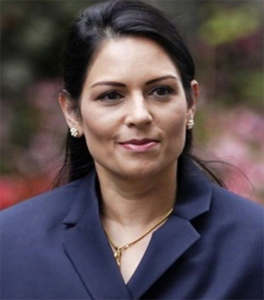The UK’s ‘two-tier’ asylum system under fire
The UK government has come under fire over its plans for a ‘two-tier’ system of asylum that would effectively crackdown on people who arrive through irregular means such as by boat across the English Channel or on freight trucks.
Prominent refugee activist and Labour peer Lord Alf Dubs says the system was not workable while calling for an international agreement on sharing responsibility for asylum seekers.
 And the British Red Cross has branded Home Secretary Priti Patel’s plans “inhumane”, and the UN’s refugee agency commented that “people have a universal right to seek asylum, even when they arrive without documents or by non-traditional means”.
And the British Red Cross has branded Home Secretary Priti Patel’s plans “inhumane”, and the UN’s refugee agency commented that “people have a universal right to seek asylum, even when they arrive without documents or by non-traditional means”.
Ms Patel described the move as “the most significant overhaul of our asylum system in decades” and said it would tackle illegal migration head-on” by making life harder for those who arrive on boats or trucks across the Channel.
But she has been criticised for proposing to deport anyone who arrives in the UK via irregular means, such as crossing the Channel in a boat, to any ‘safe country’ they have travelled through – mostly France.
If this is not possible, and their asylum claim is successful and they are recognised as refugees genuinely fleeing war or persecution by the UK authorities, they will still face the ongoing threat of deportation, with the first review 30 months after they arrive.
While Ms Patel has stopped short of some of the more hard-line measures she was tipped to be considering, she still plans to change the law to make it possible to ship asylum seekers offshore while their claims are processed.
And the UK’s Border Force will also be given powers to stop and redirect boats back to where they came from. But both these measures require international agreement.
Lord Dubs, who fled the Nazis as a child refugee, said Ms Patel’s proposals will prove unworkable without wider international agreement on sharing the responsibility for asylum seekers.
He said it was wrong to treat asylum seekers differently depending on how they arrive in the UK.
“People are fleeing terrible situations, including young men who want to escape, for example, recruitment by the Taliban,” he told UK media.
Lord Dubs also criticised the UK government for closing down legal routes to refugee status, including resettlement schemes for lone children in Europe.
“It’s just not a workable system. She’s pandering to bad instincts and is not really doing this properly,” Lord Dubs said.
“You can’t run a system by saying we’re going to keep people out, and then treating them as second class citizens if they get here,” he said.
“This is driven by politics, not by a wish to have a sensible policy.
“The only way to have a sensible policy is ensuring there are legal routes to safety, which she’s been closing down.
“Secondly, you need a broad agreement with other countries as to how we can fairly and properly share responsibility, and she’s not doing any of those,” Lord Dubs said.
He pointed out that while the UK received 31,752 asylum applications in the year ending September 2020, according to the UNHCR, European countries like France had more than 81,000 last year.
“They say: ‘Why shouldn’t they stay in France?’ If France had nearly three times as many applications as we had, the answer is: ‘Most of them do.’,” Lord Dubs said.
A statement from the British Red Cross said: “We should not judge how worthy someone is of asylum by how they arrived here. The proposals effectively create an unfair two-tiered system, whereby someone’s case and the support they receive is judged on how they entered the country and not on their need for protection. This is inhumane.”
The UNHCR said it would work with the government on improving the asylum system but suggested plans to deport people to ‘safe countries’ risk undermining protection around the world and could breach international law.
While the UK’s Home Office says the plans are compliant with the 1951 Refugee Convention and European Convention on Human Rights, the UNHCR said: “Externalisation arrangements often run counter to the spirit of international solidarity and burden-sharing”.
“They risk a gradual erosion of the international protection system, which has withstood the test of time and which we have a collective responsibility to safeguard.
“They often result in forced transfers to countries with inadequate protection safeguards and resources, and therefore risk breaching international refugee law and human rights obligations,” UNHCR said.
Responding to criticism, Patel said she would work with the Red Cross and other organisations to create safe and legal routes for asylum seekers to come to the UK.
“What is inhumane is allowing people to be smuggled through illegal migration and that is what we want to stop,” she told BBC Breakfast.
“We will create safe and legal routes to enable people to come to the United Kingdom in a safe way so that they can also be resettled in the United Kingdom and that is a fundamental change we want to bring in.”












